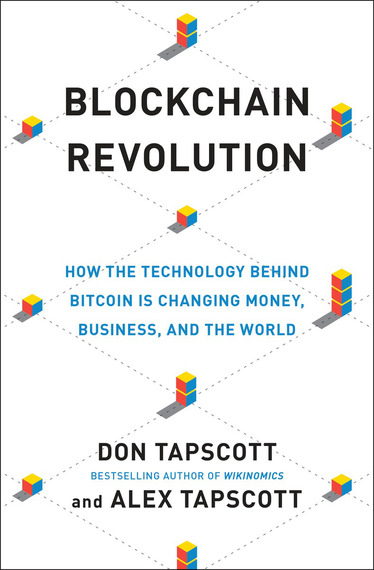Originally written by Don and Alex Tapscott
Alex who, along with his father, Don Tapscott, is the author of the upcoming book Blockchain Revolution, explains how the technology can change lives.
Q: Blockchain seems to have come out of nowhere to become a hot topic in technology and finance but few people seem to truly understand it. What is blockchain?
A: We have spent two years researching this technology and have concluded, unequivocally, that blockchain technology is the second generation of the digital revolution. The first generation brought us the Internet of Information. The second generation -- powered by blockchain -- is bringing us the Internet of Value. So what is it? Blockchain is the ingeniously simple, revolutionary protocol that allows transactions to be simultaneously anonymous and secure, peer-to-peer, instant and frictionless. It does this by distributing trust from powerful intermediaries to a large global network, which through mass collaboration, clever code and cryptography, enables a tamper-proof public ledger of every transaction that's ever happened on the network.
And while it's the technology that drives Bitcoin and other digital currencies, the underlying framework has the potential to go far beyond these and record virtually everything of value to humankind, from birth and death certificates to insurance claims and even votes.
In short, it's a new medium for value.
Q: What does this mean for average people? How will it impact their lives?
A: It will have a profound impact. Maybe you're a music lover who wants artists to make a living off their art. Perhaps you're an immigrant who's sick of paying big fees to send money home to loved ones in your ancestral land. Or a Saudi woman who wants to publish her own fashion magazine. Maybe you're an aid worker who needs to identify land titles of landowners so you can rebuild their homes after an earthquake. Or a citizen fed up with the lack of transparency and accountability of political leaders. Or a user of social media who values your privacy and thinks all the data you generate might be worth something -- to you. Or an entrepreneur looking for a new platform to build a business.
Q: What could blockchain mean for the financial services industry?
A: When we started our research a mere two years ago, few if any banks had woken up to this opportunity. Now, virtually every major player in the financial service industry -- from banks to insurers to audit and professional service firms -- are investing significant resources into this. And for good reason: Blockchain can radically reduce costs for banks, providing a boost to productivity and making it easier to offer products and services to a global clientele. They can also reduce risk in the industry, particularly in wholesale finance. Settlement times for many financial products take days, sometimes weeks, tying up capital and exposing industry participants to huge counterparty risks. Blockchain promises to radically simplify many business processes, reducing risk and boosting transparency. That's a good thing. And this is really the tip of the iceberg: Personal and commercial lending, risk management, investment banking, treasury services, global markets, insurance, technology, operations and asset management will each feel the effect.
Q: So are you saying this is actually a big opportunity for banks? What about the risks?
A: Well, the flip side of all of this is that blockchain will also radically lower barriers for new-entrants to create alternatives to the conventional banking industry, challenging incumbents in virtually every market where they operate, and so it's as much a threat as an opportunity. But it's not an existential threat to financial services firms who embrace this new technology paradigm rather than fight it. The question is, who in the financial services industry will lead this revolution in a positive way? These are exciting and perilous times. Throughout history, leaders of the old paradigms have rarely embraced the new. Why didn't AT&T launch Skype, or Visa create Paypal? CNN could have built Twitter, as it is all about the sound bite, no? GM or Hertz could have launched Uber, and Marriott, Airbnb. As with major paradigm shifts which preceded it, blockchain will create winners and losers. Though opportunities abound, the risks of disruption and dislocation must not be ignored. However, occasionally, corporate leaders have the foresight and conviction to see themselves through times of great upheaval and emerge even stronger than before.
Q: What else could be transformed by this technology?
A: Well, perhaps the most enticing for business leaders everywhere is that blockchain could empower us to re-architect the corporation, one of the pillars of modern capitalism. One of the main reasons we have corporations is because of transaction costs: so long as it's cheaper to organize capability inside the boundaries of a company rather than contracting on the open market, companies will get bigger. I wish this was an original idea, but it was coined by Ronald Coase, who won a Nobel prize for his pioneering work on the corporation. Henry Ford recognized this principle, which is why the Ford Motor Company had a rubber plantation, timber mill, steel plant and assembly line -- it was easier and cheaper to be vertically integrated than contract in an open market. The Internet helped a little bit by dropping the cost of search, communication and coordination, but if you look at the company today, it doesn't look dramatically different from the companies of the past. It still costs a lot to contract, bargain, and enforce and police agreements between counterparties. Blockchain could change all of this. With the rise of a global peer-to-peer platform for identity, trust, reputation and transactions, we will be able to re-engineer deep structures of the firm for innovation and shared value creation. This doesn't mean smaller firms in terms of revenue or impact. To the contrary, we're talking about building 21st century companies that look more like networks rather than the vertically integrated hierarchies of the industrial age.
Q: Can you give us an example of how blockchain and The Internet of Things are connected.
A: In the not-too-distant future, billions of smart things in the physical world will be sensing, responding, communicating, sharing important data, and generating, buying and selling their own electricity, doing everything from protecting our environment, charging our homes and managing our health. Cities and regions will be profoundly transformed by this revolution, as everything from public transit systems, healthcare, and power-generation stands to be disrupted. This Internet of Everything Needs a Ledger of Everything, powered by blockchain.
Consider the energy grid. Most homeowners, businesses, governments and other organizations in urban North America get their power from regulated utilities at regulated prices. Currently we have more variety in locally generated renewable energy from, say, solar panels on rooftops. The local utility captures excess power in its supply for redistribution at wholesale rates, often with considerable leakage. The consumer, who may be located across the street from a local power source, still must go through the utility and pay full retail for renewable energy generated by their neighbor. It's ridiculous. Instead, imagine each household that has the ability to generate and store electricity can enter into peer-to-peer transactions with neighbors or sell at market rate back into the grid. Millions of homes could become autonomous agents, contracting power automatically with the highest bidder. Blockchain technology is critical to all of this. With potentially millions of distributed power sources, the system needs to continuously track everything, including the ability to authenticate each node in the network -- to ensure its reliability. Power generation is one of dozens of ways cities will be transformed by blockchain technology and the Internet of things.
Q: So, should people be fearful or hopeful about the potential of blockchain.
A: They should be immensely hopeful. There is perhaps nothing more powerful than an idea whose time has come and blockchain could not have come sooner. Today we are caught in the grip of a troubling prosperity paradox. The economy is growing but fewer people are benefiting. Youth unemployment is stubbornly high, median incomes are slipping and new business formation is hitting multi-decade lows in the developed world. The rise of the Internet has done little to alleviate the bureaucratic bloat and inefficiencies in the Global South either, stranding trillions of dollars of dead money in the dark economy. With blockchain technology, a world of possibilities has opened to reverse all these trends. We now have a true peer-to-peer platform that enables personal economic empowerment: we can own our identitites and our personal data, we can do transactions, creating and exchanging value without powerful intermediaries acting as the arbiters of money and information. Billions of excluded people an soon enter the global economy. We can protect our privacy and monetize our own information. We can ensure creators are compensated for their IP. Rather than trying to solve the problem of growing social inequality through redistribution alone, we can change the way wealth -- and opportunity -- is predistributed in the first place, as people everywhere, from farmers to musicians, can share more fully in the wealth they create.
But blockchain is not a panacea for the world's problems. Technology does not create prosperity, people do. Leadership and stewardship -- everyone's personal opportunity -- will be required to ensure a fair, thriving and prosperous future for all.
This post is adapted from Don & Alex Tapscott's new book, BLOCKCHAIN REVOLUTION: How the Technology Behind Bitcoin is Changing Money, Business, and the World and originally appeared in The Toronto Star

